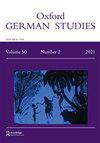文字之城:约瑟夫·f·A·奥利弗的伊斯坦布尔诗歌
IF 0.1
3区 文学
0 LITERATURE, GERMAN, DUTCH, SCANDINAVIAN
引用次数: 0
摘要
JoséF.A.Oliver的实验性城市美学需要重新思考这位标志性的法国人。在奥利弗的伊斯坦布尔诗歌中,灵魂是无实体的,让位给了一种四处游荡的意识,这种意识在情感、视觉、认知、节奏、听觉、语言等多个层面上参与了与城市相遇的体验异质性,并将这种参与变为一座文字之城。通过这种诗意的实践,读者体验到了他们想象中的城市,带着替代的恐惧和兴奋。这种非工具性的创作模式背后有一种民主精神,因为它不仅是城市的诞生,也是诗人和读者的诞生。本文章由计算机程序翻译,如有差异,请以英文原文为准。
A City of Words: José F. A. Oliver’s Istanbul Poems
José F. A. Oliver’s experimental urban aesthetics requires a rethinking of the iconic figure of the flâneur. In Oliver’s Istanbul poems, the flâneur is disembodied, giving way to a peripatetic consciousness that engages the experiential heterogeneity of the encounter with the city on multiple levels — emotional, visual, cognitive, rhythmic, auditory, verbal — and versifies this engagement as a city of words. Through this poetic practice, the readers experience the city in their imagination, with vicarious trepidation and excitement. There is a democratic ethos underlying this non-instrumental creative mode, as it is not only the city that comes into being but also the poet and the reader.
求助全文
通过发布文献求助,成功后即可免费获取论文全文。
去求助
来源期刊

OXFORD GERMAN STUDIES
LITERATURE, GERMAN, DUTCH, SCANDINAVIAN-
CiteScore
0.10
自引率
50.00%
发文量
2
期刊介绍:
Oxford German Studies is a fully refereed journal, and publishes in English and German, aiming to present contributions from all countries and to represent as wide a range of topics and approaches throughout German studies as can be achieved. The thematic coverage of the journal continues to be based on an inclusive conception of German studies, centred on the study of German literature from the Middle Ages to the present, but extending a warm welcome to interdisciplinary and comparative topics, and to contributions from neighbouring areas such as language study and linguistics, history, philosophy, sociology, music, and art history. The editors are literary scholars, but seek advice from specialists in other areas as appropriate.
 求助内容:
求助内容: 应助结果提醒方式:
应助结果提醒方式:


